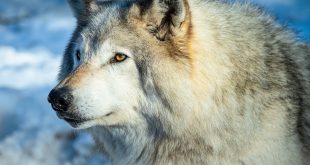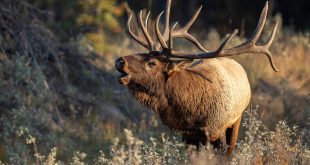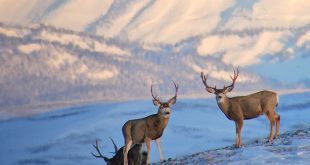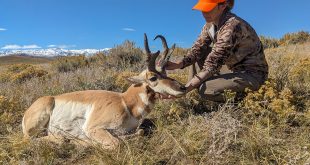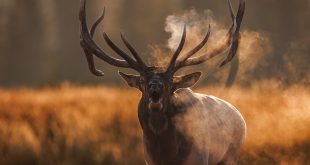The Great Gizzly Debate
By Lauren Lejeune
Reprinted with permission: 9/19/23
https://www.powelltribune.com/stories/the-great-grizzly-debate

Lauren Lejeune
Wyoming is in need of a grizzly bear hunting season.
This isn’t a new take on the current situation. These discussions have been going on for years and the state was gearing up for the first season in over 40 years before the decision was stopped back in 2018. Almost 50 years these animals have been sidelined. Now, it’s time for them to get back onto the playing field.
The fall hunting season has already begun with archery antelope season on Aug. 15 and from here it’s only going to pick up speed. Hunting in the high country comes with challenges of its own, but throwing in the overpopulated, hungry bears to the equation is something every hunter must take into consideration.
Caleb Norris, a backcountry guide, knows the risks and has dealt with issues firsthand when it comes to these bears.
“We have confrontations all of the time, we have more encounters,” Norris said. “It just makes us have to take extra measures that we didn’t have to take before. We always take the measures the Forest Service has in place, and the Game and Fish, but when it’s boiled down to the point where when we kill an elk and we have to cape, quarter and leave as fast as we can because no matter what we’ve got bears showing up … it’s getting a little ridiculous.”
Grizzly bear confrontations are not just worries for the mountains, they’re coming down into lower elevations as well.
“There’s beginning to be more bears spreading down to our lower elevations and more and more around housing. They’re having to trap and move more bears every year,” Norris said.
In recent weeks, an adult female grizzly was relocated for livestock depredation just northwest of Cody on Aug. 6. Shortly after, an adult male was removed from private land northwest of Thermopolis for killing livestock on Aug. 15.
“Our tax dollars are going more to Game and Fish for trapping and moving bears, whereas the state could be making money off of it if they would allow us to hunt them and manage them properly,” Norris said.
With the high levels of rain the Northwestern part of Wyoming has received, there is a positive note going into this hunting season.
“I think there’s probably going to be a pretty good year as far as not having bear confrontations because we had a very good spring and summer. There’s lots of feed out there, there’s lots of clover and lots of vegetation the bears are eating; they’re in pretty good shape,” said Wes Livingston, a seasoned outdoorsman with years of experience under his belt. Livingston guides hunters and fishermen, as well as net guns wildlife from helicopters. He also manufactures wildlife capture equipment and repairs saddles and tack.
But one good year of rain isn’t enough. It doesn’t guarantee or even begin to curb the overall issue this overpopulated species has become, nor does relocation.
“Relocation has gone very poorly,” Livingston said. “It’s a very noble idea that you’re going to take a bear and put it somewhere else and it’s going to make its home there while staying out of trouble. The main problem there is that a bear learns its feeding habits from its mother so every place that sow fed and took those cubs with her and they fed, that bear will check for the rest of its life.”
Livingston continued: “So, in between this berry patch and this dead elk, a bear might find some potato salad that somebody threw out, so it will check that. This adds to its “trap line” of its feeding area and will pass this information on to its cubs and those cubs will pass that information on; it’s just the way bears work. So now, if you bring a bear from the northwest corner of the park [Yellowstone National Park] and you bring it to Cody, what information does it have? You just threw it into the middle of New York City, it doesn’t even know where it is. But, they have an incredible homing instinct that’s just like a GPS and I would love to see the collar information on that bear, because if I was a betting man, my guess is that bear is headed home to where it was raised.”
Everything in our ecosystem needs to have a balance. 2022 was a dry year with a harsh winter, leading to less tags being given out this year. A simple check to keep the animal populations stable. It would be no different for grizzlies. These bears aren’t being checked. The overpopulation has led to bears competing for space, food and pushing them into more encounters with humans.
“Bears have to have a management program. If you don’t have one, eventually they take over and become a pain and that’s where they’re at. They have to start managing them or they’re going to wind up seeing more and more hikers and people who don’t have experience in dealing with them end up hurt or dead,” said Norris.
The grizzly bear population is being hurt with the decision to keep these animals protected from hunting. Once, numbers were low enough for this to be warranted and necessary. But all good things come to an end, and this one just happens to be overdue. A regulated hunting season has become a necessary step in the continuation of preserving this animal.
“I think to start, they need to start it off with 20 bears for the first year in the backcountry,” Norris said, “Make it a very managed program, similar to the wolves, there would be a quota on it. Each animal needs to be reported on time and I think they need to start a season outside of the Greater Yellowstone Ecosystem because we are having bears show up out there as well. In my mind it needs to open up on Sept. 1 and run until mid-November at least.”
“A hunting season would be the absolute best thing that can be done for the grizzly bears right now. And the reason is that there are too many bears for the available environment,” concluded Livingston. “That’s why we had a sow two years ago denning in McCullough Peaks. The only thing to eat out there is horses or cattle. There is no room in the mountains. Why do we have bears on the river? Why do we have bears in the alfalfa fields in Ralston? Because they just don’t have enough room. So the absolute best thing that I believe we could do for the bear population to stabilize it and ensure its survival is to take out one third of the population. We see more bear-on-bear depredation, boars killing young bears because they can catch them and eat them and they’ll eat another bear as fast as they’ll eat an elk; that’s just the way they are.”
 Eastmans' Official Blog | Mule Deer, Antelope, Elk Hunting and Bowhunting Magazine | Eastmans' Hunting Journals
Eastmans' Official Blog | Mule Deer, Antelope, Elk Hunting and Bowhunting Magazine | Eastmans' Hunting Journals

